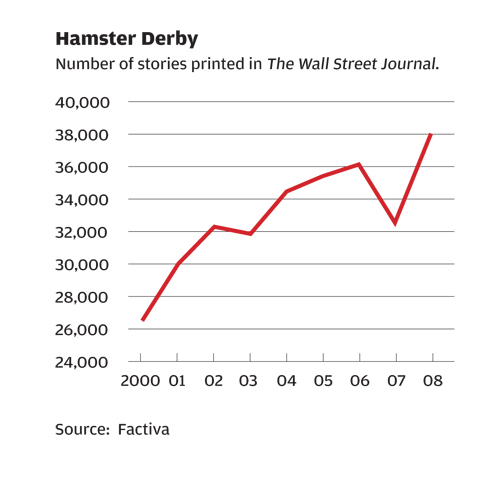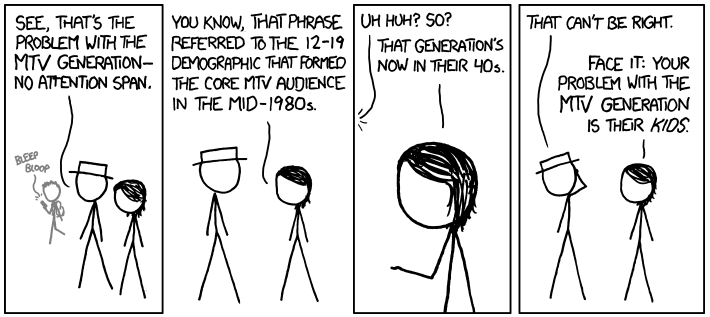Really late to the story on this, (about nine months late to be more precise), but I recently found and read an incredible piece by Dean Starkman for the Columbia Journalism Review site titled 'The Hamster Wheel'.
In the article, Starkman compares the changes in journalistic approaches, and the increasing demands on journalists to create tons of consumable content for a myriad of platforms, (TV, radio, Web, Social Networks, blogs, live blogs,and on and on), to the proverbial caged hamster running on an exercise wheel. Lots of activity, lots of energy being expended, but no real progress, and of course the hamster ends up in exactly the same place when exhaustion sets in as it was before the running started, and theoretically it still had some options.
In the context of the news business, Starkman describes the Hamster Wheel psyche like this:
The Hamster Wheel isn’t speed; it’s motion for motion’s sake. The Hamster Wheel is volume without thought. It is news panic, a lack of discipline, an inability to say no. It is copy produced to meet arbitrary productivity metrics. But it’s more than just mindless volume. It’s a recalibration of the news calculus. Of the factors that affect the reporting of news, an underappreciated one is the risk/reward calculation that all professional reporters make when confronted with a story idea: How much time versus how much impact? This informal vetting system is surprisingly ruthless and ultimately efficient for one and all. The more time invested, the bigger the risk, but also the greater potential glory for the reporter, and the greater value to the public (can’t forget them!). Do you fly to Chicago to talk to that guy about that thing? Do you read that bankruptcy examiner’s report? Or do you do three things that are easier?
It is perhaps difficult to find another industry than news and information services that has been disrupted more massively in the last 15 years or so by the rapid development of the web, the birth of so-called 'citizen journalism', and the perfect storm of cheap data plans, incredibly powerful smartphones and other mobile devices, and hundred of millions of social network platform users ready and eager to report and comment on the news - all in real-time. In the CJR piece, Starkman paints a vivid picture of increasing activity with possibly dubious benefit, and that underscores more endemic tensions in workplaces today - we are all asked to do more, or at least the same, with far less people and resources. 
The article contains an example of the Hamster Wheel in action using the illustrative chart on the right - over the last ten or so years, story production in the printed Wall Street Journal has increased substantially, with corresponding reductions in headcount leading Starkman to conclude the average WSJ reporter is now 69% more productive that in 2000.
In the race for web traffic, more views of a networks' or news organizations' YouTube videos, 'likes' on Facebook, or Twitter followers; Starkman makes the argument that the traditional values and importance of deeply reported and in-depth investigative pieces (the ones that can't really be tweeted), are suffering. And not only are news organizations steering away from the investment of time and resources to produce these pieces, the long-term financial benefits of the current 'Hamster Wheel' strategy are dubious at best. Some estimated claim the popular and 'Web 3.0' model of journalism The Huffington Post only creates about one dollar of revenue per reader per year.
Is that a large, more applicable to the workplace take on all of this? In other words, why did I just spend 45 minutes and 600 or so words writing about a nine-month old article on the news business?
Well here goes - I think many of us of running on our own personal or organizational Hamster Wheels. We too have to be everywhere. We have to connect and communicate with colleagues and staff on many more platforms than ever before. We have to engage potential job candidates all over the social web, and create compelling engagement strategies for the conversation, (that will work on all kinds of mobile devices including ones that have not been invented yet). We have to stay on top of news, information, coming and goings in our industry in a 24/7 global context.
In short, we kind of have convinced ourselves, just like the execs at many of the news organizations that Starkman discusses in the CJR piece, that we can't take a breath, miss a tweet, an update, follow the hashtag from a conference we could not get to, or let someone else beat us to the punch. It is a hard way to live without any kinds of filters to know what is truly important and meaningful and what isn't.
I'll leave you with a final nugget of insight from the the piece:
The most underused words in the news business today: let’s pass on that.
They might be the most underused words in your business too.

 Steve
Steve





